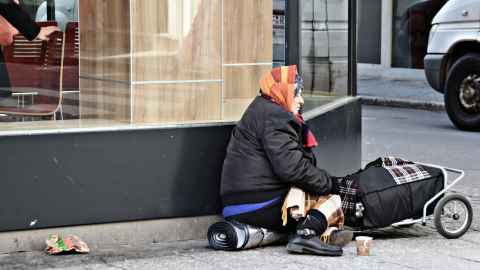The ‘sturdy beggar’ back to haunt us
9 May 2018
Opinion: Policy shifts that redistribute wealth and opportunity are necessary if we want to avoid the spectre of beggars in our midst, writes Dr Ian Hyslop.

In Aotearoa New Zealand we all live within the boundaries of a socio-economic system. This system has a name: capitalism. And as Winston Peters touched on when announcing the new coalition Government in October 2017, it is not a system that works for everyone.
An acquaintance of mine recently spoke of a brief exchange with a stranger who was commenting on someone begging in the street. He came out with the age-old chestnut that no one in this country needs to be begging or stopping strangers for help - we have a welfare system in place so they must be harassing people through choice.
This exchange speaks to a belief system held by many of us – that you should not have to beg in God’s Own Country and, by association, that there must be something morally wrong with those who do such things. This view-point allows us to ignore the bigger picture of the sort of country that we have chosen to become.
For the last 30 years we have deliberately structured our society as more competitive and self-centric. We have engaged in a deregulated economic race on a steeply-tilted playing field which has resulted in visible exclusion and social suffering reminiscent of the 1930s or perhaps the 1890s. The undeserving ‘sturdy beggar’, that folk devil of centuries past, has returned to haunt us.
We are often angered by the things we fear the most, and one of the greatest fears in competitive capitalist societies is the danger of falling off the economic ladder and being left behind. We have a welfare system that is meant to help when people have those falls, but it is strict and conditional with stand-downs and sanctions for non-compliance.
For the last 30 years we have deliberately structured our society as more competitive and self-centric.
The reality is, and this is where the welfare system fails to deliver, that not everyone is in a position to meet these conditions. It is difficult to produce proof of address when you are homeless, to produce proof of identity when your wallet has been lost or stolen, or to be work-ready when you are sleeping rough. Try it some time.
Add to this experiences of violence, abuse, poor physical or mental health and addiction problems, fear and distrust of state authority, social isolation and you begin to appreciate some of the reasons that we have obvious poverty on our streets.
We have a damaging social legacy of abuse in institutional care in this country which a Royal Commission will shortly begin investigating and reporting on. We also have a disproportionately high prison population. Prisons isolate and punish and do not prepare people for re-entry into work and social life, with the result that more people are unable to participate and belong in what has become a sharply divided society. All of these social ills are visited disproportionately on tangata whenua because of the way historic colonisation intersects with social class disparities.
The current Government is looking at rolling back some of the more punitive elements of our welfare system. However, wider policy shifts that redistribute wealth and opportunity and foster a more equal society are necessary if we want to avoid the spectre of beggars in our midst. Or, perhaps it would be more comfortable to simply turn away from this reality: why don’t they just get a job?
Dr Ian Hyslop is a senior lecturer in Counselling, Human Services and Social Work, in the Faculty of Education and Social Work, University of Auckland.
This article reflects the opinion of the author and not the views of the University of Auckland.
Used with permission from Newsroom, The ‘sturdy beggar’ back to haunt us published on Wednesday 9 May 2018.